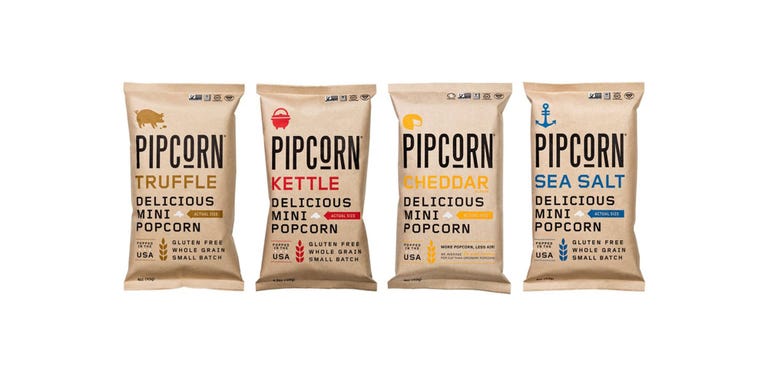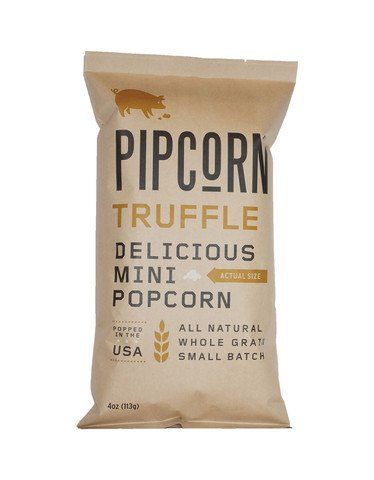
First, I saw Pipcorn at a trendy outdoor food market. Then, the cute coffee shop on the corner started carrying it in snack-size packaging. Now, the Whole Foods snack aisles seem overrun it.
So I had to know—why are so many people (at least, those who shop at organic bodegas and farmers markets) obsessed with Pipcorn?

Pipcorn is a “mini” variety of popcorn, according to the Pipcorn website. Each Pipcorn kernel is about half the size of your standard popcorn kernel, and it’s made from a special variety of corn. The product was chosen by Shark Tank‘s Barbara Corcoran to get a $200,000 investment deal back in 2015, according to Business Insider.
Pipcorn comes in different flavors like ghee (which is clarified butter), cheddar, kettle, truffle, and sea salt.
So…is Pipcorn the same thing as popcorn?
TBH, kind of. Pipcorn bills itself as “mini popcorn” and even the ingredients lists just says it’s primarily “non-GMO popcorn.”
One (minor) difference: Pipcorn says that the hulls on their corn kernels are “more delicate” than regular popcorn kernels. So, when they’re popped, the shells break into such small pieces that you don’t get big hard pieces stuck in your teeth as often, according to the company.
As for nutritional comparisons…here’s what you’re getting with a two-and-a-half cup serving of salted popcorn:
Compare that to what you get in a two-and-a-half cup serving of the sea salt variety of Pipcorn:
So…Pipcorn and popcorn are basically the same thing from a nutritional standpoint.
In the FAQs on their website, the makers of Pipcorn also claim that some people find their kernels are “easier to digest” than traditional popcorn. However, this doesn’t appear to be backed by science (WomensHealthMag.com reached out to Pipcorn for comment and has yet to hear back).
But popcorn in general is high in fiber, which most people can digest just fine as long as they’re used to eating it and drinking plenty of liquids, says Alissa Rumsey, R.D., founder of Alissa Rumsey Nutrition and Wellness in New York City.
Pipcorn advertises itself as gluten-free and made with whole grains, but “all corn (i.e., both popcorn and Pipcorn) is gluten-free and whole grain,” says Rumsey. (Although unlike Pipcorn, some popcorn might be manufactured in facilities that process wheat, so if you have a gluten allergy, def look for that gluten-free certification label on whatever you buy, including popcorn.)
Should you eat Pipcorn, then?
All of this “Pipcorn is just popcorn” talk doesn’t mean that Pipcorn isn’t worth your time. “I think it’s a cute idea if you want to put a fun spin on a healthy snack that was getting a bit boring,” says Beth Warren, R.D., founder of Beth Warren Nutrition and author of Secrets of a Kosher Girl. “But other than the marketing component, Pipcorn isn’t different than popcorn nutritionally.”
Having some variety in your diet, even if it’s just tweaking the size and style of your popcorn, can also help you avoid feeling bored or deprived, says Jessica Cording, a New York-based R.D. “But you still want to make sure that you’re enjoying it within the context of an overall balanced day of eating that supports your health and fitness goals,” she adds.
The bottom line: Pipcorn is literally just fancy, tiny popcorn—but if you love it, go for it! There’s def room for it in a healthy, balanced diet.
Source: Read Full Article